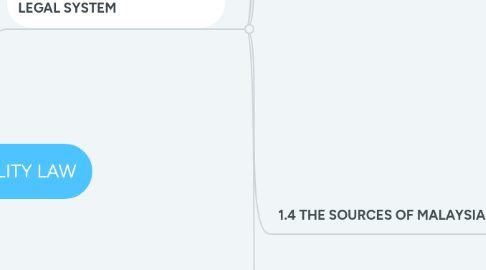
1. CHAPTER 1: THE MALAYSIANS LEGAL SYSTEM
1.1. 1.1 INTRODUCTION
1.1.1. Malaysian Legal System
1.1.1.1. historically malaysia was once a british colony,in 1957.
1.1.1.1.1. in 1963,sabah sarawak and singapore merged with malaya to form malaysia singapore.
1.2. 1.2 THE FEDERAL SYSTEM
1.2.1. 2 level of government
1.2.1.1. Federal Governement
1.2.1.1.1. The Federal Government has no complete power over the state government
1.2.1.2. State Governement
1.2.1.2.1. State governement does not have total freedom to make the law or to implement the policy it want.
1.2.2. Federal Constitution
1.2.2.1. The form and powers of the government and the fundemental by with the country should follow.
1.2.3. Different legislative compentence
1.2.3.1. A central characteristics of a federal system is that the states within the federation have their own legislative assemblies or law/making bodies.
1.2.4. Tourism Planning
1.2.4.1. Tourism comes under the federal list.
1.2.4.2. The federal goverment is responsbill for overall tourism planning and development.
1.2.4.3. Other goverment agencies whoes work directly or indirectly impact on the tourism sector.
1.2.5. Policies And Guideliner
1.2.5.1. Apart from encting statutes pertaining to the tourism industry
1.2.5.2. Policies and guidelines do not have the force of law,goverment officials and the private sector tend conform to them.
1.2.6. State Tourism Planning
1.2.6.1. Various states or federal territories may have specific tourism develpment stratgies
1.2.6.1.1. Kuala Lumpur Tourism Policy (formulated by the city council,Dewan Bandaraya Kuala Lumpur.
1.2.7. Implemention at local level
1.2.7.1. Structure plan
1.2.7.1.1. prepared by the federal Town and Country Planning Authority For the adoption by the state goverment.
1.2.7.2. Local Plan
1.2.7.2.1. Prepared by the state authorities .
1.3. 1.3 PARLIAMENT, THE EXECUTIVE AND THE JUDICIARY
1.3.1. 1.3.1 Parliament ( elected for a maximum period of 5 years)
1.3.1.1. - Yang di-Pertuan Agong
1.3.1.1.1. i. Advice the Primae Minister. This is usually to make a way for general election.
1.3.1.1.2. ii. Empowered by article 150 to issue a proclamation of emergency.
1.3.1.2. - Dewan Negara
1.3.1.2.1. i. Has 70 appointed senators.
1.3.1.3. - Dewan Rakyat
1.3.1.3.1. i. Has 222 members
1.3.2. 1.3.2 The Executive
1.3.2.1. i. The government of the day
1.3.2.2. ii. To implement the laws as the laws as enacted by Parliament and to act in the interests of the people.
1.3.2.3. iii. Members of Parliament whose role is to scrutinise the actions of the government.
1.3.3. 1.3.3 The Judiciary
1.3.3.1. i. To decide cases based on existing law.
1.3.3.2. ii. Elected by tyheir respective constituencies during the general election
1.4. 1.4 THE SOURCES OF MALAYSIAN LAW
1.4.1. Malaysia law may be written or unwritten
1.4.1.1. Written law refer to the statues enacted by parliament.
1.4.1.2. Case law or common law developed by the courts is considered unwritten law.
1.4.1.3. Syariah law is relevant to Muslim majority.
1.4.2. Statues
1.4.2.1. Laws enacted by Parliament are called 'statutes'
1.4.2.1.1. Example:Inkeepers Act 1952,Registrationof Guest Act 1965,The Food Act 1983.
1.4.3. Delegated Legislation
1.4.3.1. The law made by the minister called 'delegated legislation
1.4.3.1.1. Example : 34 of the Food Act 1983
1.4.3.2. In order carry out the purpose of the act.
1.4.4. Common law
1.4.4.1. Adopt a signficiant different interpretation of existing law, or where they deal with 'first time 'situation that are not covered by exciting law.
1.4.5. Principles Of English law applicable to local circumstances
1.4.5.1. Section 3 of the civil Law Act allows our court to adpot English Law as our law where they are apllicable to the local circumstance.
1.4.6. Syariah Law
1.4.6.1. Most Syariah matters fall within the State List and are dealt with by the state legislative aasemblies.
1.4.7. Customs
1.4.7.1. Martial cases
1.5. 1.5 COURT STRUCTURE (Defendant, Plaintiff, Appellant and Respondent)
1.5.1. Magistrates' Court
1.5.1.1. First Class Magistrate
1.5.1.1.1. Can hear all civil claims that do not exceed RM100,000.
1.5.1.2. Second Class Magistrate
1.5.1.2.1. Can only hear a civil matter that does not exceed RM10,00
1.5.2. Small Claims Procedure
1.5.2.1. Whose claim does not exceed RM5,00 may proceed under the small claims procedure.
1.5.3. Sessions Court
1.5.3.1. All matters concerning motor vehicle accident, landlord and tenant and distress, regard of the monetary value.
1.5.4. High Court
1.5.4.1. Criminal cases and appeal against decision of the subordinate courts.
1.5.5. Court of Appeal
1.5.5.1. Hears civil and criminal appeals against dicision of the High Court.
1.5.6. Faderal Court
1.5.6.1. Hears criminal appeal from the court of Appeal but only where the case was heard by the High Court in its original jurisdiction.
1.5.7. Other Consumer Claims Tribunal
1.5.7.1. Syariah Court
1.5.7.1.1. over matters relating to islamic law where the parties are Muslims.
1.5.7.2. Native Court
1.5.7.2.1. Who still practise native customs may have their disputes resolved at the Native Court
1.5.7.3. Industrial Court
1.5.7.3.1. To trade disputes and dismissal of employees.
1.5.7.4. Consumer Claims Tribunal
1.5.7.4.1. Consumers claim tribunal is limited to claim RM25,000 therefore Tribunal can exceed the claim limit if both parties agree in writing to have jurisdiction to hear and decide the claim.
